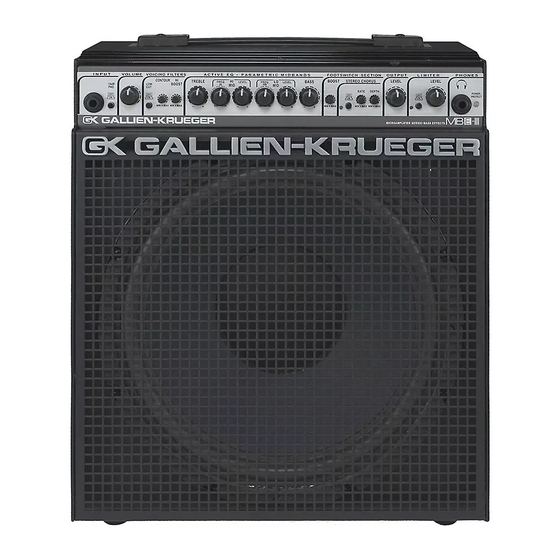Gallien-Krueger Microbass MB150E Benutzerhandbuch - Seite 9
Blättern Sie online oder laden Sie pdf Benutzerhandbuch für Verstärken Gallien-Krueger Microbass MB150E herunter. Gallien-Krueger Microbass MB150E 12 Seiten. Iii series
Auch für Gallien-Krueger Microbass MB150E: Benutzerhandbuch (12 seiten)

- 1. Owner's Manual
- 2. Warranty Card
- 3. Safety Instructions Sheet
- 4. Table of Contents
- 5. Power Cord
- 6. Safety Information
- 7. GK Philosophy
- 8. Setup & Quickstart
- 9. Front Panel Controls
- 10. Rear Panel Controls
- 11. Internal/External Speakers
- 12. Sample Settings
- 13. Sound Advice
- 14. Tech Talk
- 15. Specifications
Sound Advice
Input Volume vs. Output Level:
The Input Volume adjusts the signal as it enters the
preamp section. Changes to it will have an impact on
the Send jack, Boost control, and the Direct Output if
it is set to Post mode. Depending on the output signal
from your bass, setting the volume below 1 o'clock
produces a cleaner signal while setting it above 1 o'clock
produces a subtle overdrive effect.
The Output Level adjusts the volume of the Internal
Power Amplifier, after the preamp (Post EQ). For
most playing situations, the Output Level is set be-
tween 12 and 3 o'clock. Set it above 3 o'clock for
maximum power situations.
Note: Be careful not to overdrive the Internal Am-
plifier. This creates a square wave (fully clipped
signal) which may cause damage to your speaker
regardless of it's power rating.
Contour:
Increasing the Contour level will scoop out midrange
frequencies while boosting the highs and lows. The
sound is unique to GK and unavailable on any other
bass amp. Lower contour settings are recommended
for midrange clarity at higher playing levels.
Presence:
The Presence control is great for slap style playing or
if you need to add a little extra high-end sparkle to
your tone. It's particularly useful if your strings are old
and dull sounding.
Equalization:
The Equalizer is used to fine tune your sound. When
changing the settings, try making only subtle adjust-
ments at first. These are active circuits, and small
changes can make a big difference.
Boost Control:
The Boost Control adjusts the Valve Effect (See Tech
Talk for more info). Turning up the Boost will add a
little growl to your tone. This is an unmistakable, highly
sought after, GK trademark sound. Raising the Boost
MicroBass-III Series
While lowering the Master will add more growl while
keeping the sound level relatively even. The 'growl' is
actually a small amount of even order harmonic dis-
tortion. For most playing situations, start with the Boost
at 12 o'clock. Reduce for a cleaner sound, or in-
crease for more growl. When overdriving the Preamp,
increase the Boost control to fatten up the tone.
Direct Out:
Your GK amplifier includes a low noise, high quality
balanced Direct Out for connection to PA and record-
ing consoles. The MBS is set for Pre EQ. The MBE
has two Direct Outputs which can be set with one in
Pre and one in Post simultaneously, or both in Post
Stereo L/R to accommodate the built in stereo chorus.
Both the MBE and the MBS include a Ground (Gnd)
Lift switch to remove hum and buzz when connecting
to equipment powered by a different ground system.
When in Pre Output mode, the signal is fed directly
from our low noise, high headroom, FET input stage
to the Direct Output. This provides a low noise out-
put superior to external direct boxes and impedance
transformers. Using Pre-Output mode, the Direct
Output signal is only effected by the -14dB Pad and
Tuning Mute controls. This allows you to adjust your
tone and volume on stage without changing the Direct
Output signal level.
Post-Output mode sends the fully effected preamp
signal to the Direct Out. This gives you complete con-
trol over your Direct Out tone and volume and has the
added benefit of really annoying the sound guy.
9
